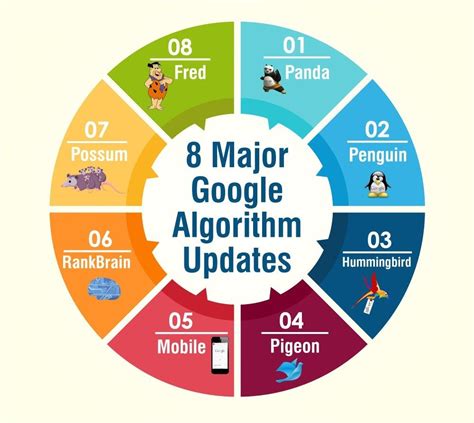Are you tired of struggling to boost your online presence and climb up the search engine ladder? If you want to enhance the visibility of your website and attract more organic traffic, then you're in the right place. In this article, we will explore ten ingenious strategies that can significantly contribute to improving your website's search engine ranking.
1. Optimize Your Content: Creating high-quality, engaging, and relevant content is the cornerstone of any successful website. By incorporating targeted keywords strategically throughout your content, you can communicate effectively with search engines and improve your website's visibility to potential visitors.
2. Enhance your Meta Tags: Don't underestimate the power of meta tags. These HTML elements provide information about your webpage to search engines and users. Craft compelling title tags and meta descriptions that accurately represent your content, making it more appealing and enticing for both search engines and users.
3. Build Quality Backlinks: Backlinks are like votes of confidence for search engines. The more high-quality and relevant backlinks you have, the more authoritative your website appears. Engage in strategic link-building activities such as guest blogging, influencer outreach, and directory submissions to establish your website as a trusted source in its niche.
4. Ensure Mobile Compatibility: In this digital era, mobile devices dominate the internet landscape. Making your website mobile-friendly is crucial for ensuring a seamless user experience and improving your search engine ranking. Optimize your website's layout, images, and content to fit different screen sizes and resolutions.
5. Speed Up Your Website: Patience is a virtue that most internet users have little of. Optimizing your website's loading speed can significantly impact user experience and search engine rankings. Compress images, minimize CSS and JavaScript files, and leverage caching techniques to enhance your website's speed.
6. Engage in Social Media Marketing: Social media platforms provide an excellent opportunity to expand your online presence and increase brand awareness. Share your website's content on popular social media platforms, interact with your audience, and encourage them to engage and share your content to improve your website's visibility.
7. Improve User Experience: User experience is paramount when it comes to website optimization. A user-friendly website that offers easy navigation, clear calls to action, and relevant information will not only make your visitors happy but also indicate to search engines that your website is relevant and deserves a higher ranking.
8. Utilize Schema Markup: Implementing structured data markup, also known as schema markup, helps search engines better understand the content and context of your website. By providing additional information, such as ratings, reviews, and events, you can enhance your website's visibility in search engine results pages and attract more organic traffic.
9. Regularly Update Your Website: To stay relevant and competitive in the ever-evolving online landscape, make it a priority to keep your website up to date. Regularly post fresh and valuable content, update outdated information, and fix broken links. Search engines love websites that provide the latest and most relevant information to users.
10. Monitor and Analyze Performance: To effectively optimize your website, it's crucial to monitor its performance regularly. Utilize analytics tools to track important metrics such as organic traffic, bounce rates, and conversion rates. Identify areas for improvement and adjust your optimization strategies accordingly to stay ahead of the competition.
Now armed with these powerful optimization techniques, you are ready to take your website ranking to new heights. Implement these strategies with dedication and consistency, and watch your website climb up the search engine ladder, attracting more visitors and driving higher conversion rates.
Create Compelling and Relevant Content that Boosts Your Site's Visibility

In today's digital landscape, the key to optimizing your website's search engine visibility lies in the creation of high-quality and relevant content. By developing compelling and informative content that resonates with your target audience, you can enhance your website's visibility in search engine results pages and attract more organic traffic.
One crucial aspect of creating high-quality content is ensuring that it is relevant to your target audience. Understanding the needs and interests of your target market allows you to craft content that addresses their pain points and provides valuable solutions. By incorporating relevant keywords and phrases, you can improve your website's relevance to the search queries your potential visitors are making.
When creating content, it's essential to focus on delivering value to your audience. Providing unique insights, expert opinions, and practical tips allows you to establish yourself as a trusted authority in your niche. This not only helps to build credibility but also encourages visitors to spend more time on your website, reducing your bounce rates and improving your search engine rankings.
Another critical factor in creating high-quality content is ensuring that it is well-written and engaging. Users are more likely to stay on a website that offers valuable information presented in a clear and concise manner. Using strong and compelling language, structuring your content effectively, and incorporating visual elements such as images and videos can all contribute to an engaging user experience.
Additionally, regularly updating your content can have a significant impact on your search engine rankings. Search engines favor websites that provide fresh and up-to-date information. By regularly adding new content or updating existing pages, you demonstrate to search engine algorithms that your website is active and relevant, increasing your chances of ranking higher in search results.
In summary, creating high-quality and relevant content is a crucial aspect of improving your website's visibility in search engine results. By understanding your target audience, providing valuable insights, and employing engaging language, you can enhance your website's search engine rankings and attract more organic traffic to your site.
Boost Your Website's Loading Speed for Better Performance
When it comes to enhancing the overall performance of your website, one crucial aspect to focus on is optimizing its loading speed. The faster your website loads, the better user experience it provides, leading to increased engagement, lower bounce rates, and higher conversion rates. In this section, we will explore effective methods to enhance your website's loading speed, ensuring a smooth browsing experience for your visitors.
1. Minimize HTTP Requests
- Combine and minify CSS and JavaScript files to reduce the number of requests made by the browser.
- Optimize and compress images to decrease their file size without compromising quality.
- Consider using CSS sprites to combine multiple smaller images into one larger image, minimizing HTTP requests.
2. Enable Browser Caching
- Set proper caching headers to allow the browser to store certain website resources and serve them locally, reducing the need for repetitive downloads.
- Utilize a content delivery network (CDN) to cache static files, such as images, CSS, and JavaScript, in servers located closer to your visitors.
3. Optimize CSS and JavaScript
- Minify CSS and JavaScript files by removing unnecessary spaces, comments, and line breaks.
- Place JavaScript at the bottom of your HTML document or use asynchronous loading techniques to prevent delays in rendering the rest of the page content.
- Utilize CSS media queries to load different stylesheets based on the device screen size, improving responsiveness and reducing unnecessary resource loading.
4. Utilize Content Delivery Networks (CDNs)
- Offload static files to CDNs, reducing server load and improving loading speed by serving content from the nearest available server to each user.
- Consider using a globally distributed CDN with servers strategically placed worldwide for optimal routing and faster content delivery.
5. Optimize Your Website's Code
- Ensure your HTML, CSS, and JavaScript code is clean and well-structured to facilitate faster parsing by browsers.
- Remove any unnecessary or unused code and files to reduce the overall file size of your website.
- Consider using server-side compression techniques, such as Gzip, to further reduce the size of your files during transmission.
6. Implement Lazy Loading for Images
- Lazy loading delays the loading of non-visible images until they are about to be displayed, reducing the initial load time of your webpage.
- Use lazy loading plugins or JavaScript libraries to easily implement this technique on your website.
7. Optimize Your Website's Database
- Regularly clean up and optimize your website's database by removing unnecessary data, optimizing queries, and ensuring efficient indexing.
- Utilize caching mechanisms to avoid repetitive database queries, improving overall loading speed.
8. Reduce Server Response Time
- Monitor your server's performance and identify any bottlenecks or resource-intensive processes that may be slowing down the response time.
- Consider upgrading your hosting plan, utilizing caching techniques, or implementing server-side optimizations to improve response time.
9. Enable Compression
- Configure your server to enable compression, such as Gzip, to reduce the size of the files transmitted between the server and the browser.
- Compressed files can be quickly transferred, resulting in faster loading times for your website.
10. Regularly Monitor and Test Your Website's Loading Speed
- Use online tools or browser extensions to regularly monitor your website's loading speed and identify areas for improvement.
- Perform speed tests from different locations to ensure optimal performance across various geographical locations.
- Continuously optimize and fine-tune your website, keeping up with the latest best practices and technological advancements.
By implementing these strategies and continuously monitoring your website's loading speed, you can significantly enhance its performance, user experience, and ultimately boost your online presence.
Enhance Your Website's Visibility with Relevant Keywords

One crucial aspect of improving your website's visibility on search engines is the strategic use of relevant keywords in your page titles and meta descriptions. These elements play a significant role in determining how well your website ranks in search engine results. By incorporating appropriate and targeted keywords into your titles and descriptions, you can effectively communicate the content and purpose of your web pages to both search engines and potential visitors.
When crafting page titles and meta descriptions, it is important to choose keywords that accurately reflect the topic or theme of your web page. These keywords should align with what users are searching for and relate directly to the content they can expect to find on your site. It is crucial to strike a balance between using popular and commonly searched keywords while also considering the level of competition for those terms.
One way to identify relevant keywords is by conducting keyword research. This involves analyzing the search volume and competitiveness of different keywords to determine which ones are most likely to attract organic traffic to your website. Additionally, you can leverage tools such as Google Keyword Planner, SEMrush, or Moz's Keyword Explorer to gain insights into popular search terms and identify keywords that are relevant to your industry or niche.
Once you have identified the most relevant keywords, make sure to incorporate them into your page titles and meta descriptions in a natural and compelling manner. Avoid stuffing your titles and descriptions with too many keywords, as this can negatively impact user experience and may even lead to search engines penalizing your website. Instead, focus on creating concise and informative titles and descriptions that accurately represent the content of your web page.
Remember that search engines not only look at the presence of keywords in your titles and descriptions but also the overall relevance and quality of your content. So, it is crucial to ensure that your web pages offer valuable and engaging content that aligns with the keywords you have chosen. By effectively utilizing relevant keywords in your page titles and meta descriptions and delivering high-quality content, you can significantly enhance your website's search engine ranking and attract more organic traffic.
Optimize URL Structure and Navigation for Better Search Visibility
Creating a well-structured website URL system and user-friendly navigation are crucial for enhancing your website's search engine visibility. By implementing effective strategies to optimize these aspects, you can significantly improve your website's chances of ranking higher in search engine results.
One important factor to consider is the organization of your website's URLs. Ensure that your URLs are concise, descriptive, and keyword-rich, as they directly impact search engine algorithms in determining the relevance and ranking of your pages. By including relevant keywords in your URLs, search engines can better understand the content and purpose of your pages, increasing their visibility to potential visitors.
In addition to optimizing the URLs, it is vital to create a logical and intuitive navigation structure for your website. Clear navigation menus and internal linking between pages make it easier for both users and search engines to navigate through your site. By organizing your content in a hierarchical manner and providing breadcrumb navigation, you can help visitors and search engine crawlers understand the relationships between different pages and sections of your website.
Furthermore, consider implementing a website sitemap, which acts as a roadmap for search engines to discover and index your web pages. A well-structured sitemap provides search engines with a comprehensive overview of your website's content, ensuring that all relevant pages are indexed and considered for search engine ranking.
It is also essential to prioritize user experience when optimizing your website's URL structure and navigation. Ensure that your website loads quickly and is mobile-friendly, as these factors contribute to both user satisfaction and search engine rankings. Keep in mind that search engines, like Google, prioritize websites that offer a seamless and intuitive browsing experience.
| Key Tips: |
| 1. Use descriptive and keyword-rich URLs |
| 2. Create clear and intuitive navigation menus |
| 3. Implement breadcrumb navigation for better context |
| 4. Include a sitemap for search engine crawlers |
| 5. Optimize website speed and mobile-friendliness |
Enhance Online Visibility through Linking Strategies

One effective technique to optimize your online presence involves the strategic utilization of internal and external linking. By incorporating relevant hyperlinks within your website's content, you can enhance user experience, increase search engine discoverability, and ultimately improve your website's visibility in search results.
- Internal Linking:
- External Linking:
- Link Anchor Text:
- Strategic Link Placement:
- Regular Link Auditing:
Internal linking refers to the practice of linking different pages or sections within your own website. When implemented strategically, internal links create a web of connections that facilitate easy navigation for users and search engines. They help establish a logical structure and hierarchy within your website, enabling search engines to better understand the relevance and importance of each page.
External linking, on the other hand, involves linking to reputable and authoritative websites outside of your own. By referencing reliable sources, you not only provide value to your readers but also establish credibility for your website in the eyes of search engines. This can contribute to higher search engine rankings and increased trustworthiness among your audience.
The choice of anchor text, or the visible and clickable text within a hyperlink, plays a crucial role in optimizing your linking strategy. Instead of using generic phrases like "click here," it is important to utilize descriptive and keyword-rich anchor text. This helps search engines understand the context and relevance of the linked page, thereby improving keyword associations and boosting your website's visibility for specific search queries.
The placement of your links within your website's content also impacts their effectiveness. Consider incorporating relevant internal and external links naturally within the body of your text. Users and search engines are more likely to engage with links that are contextually related to the surrounding content. Additionally, including links in prominent positions such as within headings or bullet points can further enhance their visibility and engagement.
It is essential to periodically review and audit your website's links to ensure they remain functional and relevant. Remove or update any broken or outdated links as they can negatively impact user experience and search engine rankings. Additionally, assess the quality and relevance of external links, as linking to non-reputable sources can harm your website's credibility.
By implementing a well-rounded internal and external linking strategy, you can strengthen your website's online presence, improve search engine visibility, and ultimately attract more targeted traffic to your site. Remember to prioritize relevancy, quality, and user experience when incorporating links into your web pages.
Enhancing Image Optimization to Boost Visibility on Search Engines
In today's digital landscape, the optimization of images plays a crucial role in improving the visibility and search engine ranking of your website's content. By implementing effective image optimization strategies, you can ensure that your images are easily discoverable and contribute to enhancing the overall user experience.
| Benefits of Image Optimization |
|---|
| Improved loading speed |
| Enhanced user engagement |
| Increased organic traffic |
| Better accessibility for visually impaired users |
When it comes to optimizing images for search engines, there are several key factors to consider. Firstly, it's essential to choose the right file format for your images. Utilizing suitable formats such as JPEG, PNG, or SVG can significantly impact the loading speed and quality of your images.
In addition to file format, paying attention to image size is crucial. By resizing and compressing images without compromising quality, you can substantially enhance the loading speed of your website, leading to improved search engine rankings.
Moreover, including relevant alt text for each image is another crucial aspect of image optimization. Alt text allows search engines to understand and index your images accurately, making them more likely to appear in relevant search results. It's important to provide descriptive alt text that accurately represents the content and context of your images.
Furthermore, optimizing image filenames is often overlooked but can have a significant impact on search engine optimization. Using descriptive filenames that incorporate relevant keywords can help search engines understand the content and context of your images, ultimately contributing to better visibility and rankings.
Lastly, utilizing responsive design principles and ensuring that your website is mobile-friendly is essential. With the increasing number of users accessing the internet via mobile devices, it's crucial to optimize your images for various screen sizes, allowing for a seamless user experience across all devices.
By implementing these image optimization strategies, you can enhance your website's search engine visibility and improve the overall performance of your online presence. Remember, thoughtfully optimized images not only attract search engines but also enhance the user experience, leading to increased engagement and conversion rates.
Stay Updated with the Latest SEO Trends and Algorithm Updates

Ensuring your website's visibility and success in search engines is a constant and dynamic process. In today's fast-paced digital landscape, it is crucial for website owners and marketers to stay informed about the ever-evolving world of Search Engine Optimization (SEO) trends and algorithm updates.
Remaining up-to-date with the latest SEO trends and algorithms allows you to adapt your website's strategy, content, and technical aspects to meet the changing requirements of search engines. By staying informed, you can enhance your website's chances of ranking higher and attracting organic traffic.
With search engines continuously refining their algorithms and introducing new ranking factors, it is essential to keep track of the latest developments. By understanding these trends, you can optimize your website accordingly, ensuring it remains relevant and visible to both search engines and your target audience.
Regularly monitoring and analyzing SEO trends and algorithm updates empowers you to make informed decisions when it comes to content creation, website structure, keyword targeting, and link building strategies. By implementing best practices based on current SEO trends, you can enhance your website's overall performance and maximize its visibility in search engine results.
Furthermore, keeping a close eye on SEO trends and algorithm changes will enable you to stay ahead of your competitors. As the digital landscape evolves, some strategies that were once effective may lose their effectiveness, while new approaches emerge. By embracing these changes, you can gain a competitive edge and position your website as a leading player in your industry.
Whether it is understanding the growing importance of mobile optimization, the rise of voice search, the impact of user experience on rankings, or the integration of artificial intelligence in search algorithms, staying updated with SEO trends and algorithm updates is crucial for long-term success.
Creating a Mobile-Optimized Website
As the use of mobile devices continues to rise, it has become crucial for websites to adapt to this trend and provide a seamless user experience on all screen sizes. A mobile-friendly website ensures that it is easily accessible and navigable for users accessing it through smartphones and tablets.
When designing a mobile-optimized website, there are several key factors to consider. First and foremost, the layout should be responsive and flexible, allowing the content to adjust and fit appropriately based on the screen size. This helps eliminate the need for users to zoom or scroll horizontally to view the information, creating a more user-friendly experience.
Additionally, it is important to prioritize the loading speed of the website on mobile devices. Mobile users tend to have limited attention spans and slower internet connections, so optimizing images and reducing the file sizes can significantly improve the loading time. This not only enhances the user experience but also positively impacts the website's search engine rankings.
| Benefits of a Mobile-Friendly Website |
|---|
| Enhanced User Experience: By providing a seamless mobile experience, users are more likely to stay on your site longer, browse more pages, and convert into customers. |
| Better Search Engine Rankings: Search engines prioritize websites that are mobile-friendly, leading to higher visibility and increased organic traffic. |
| Improved Conversion Rates: A mobile-optimized website increases the chances of turning visitors into leads or customers, as it streamlines the conversion process and makes it easier for users to take action. |
| Increase in Mobile Traffic: With the increasing number of smartphone users, having a mobile-friendly website ensures you don't miss out on potential traffic from this demographic. |
In conclusion, optimizing your website for mobile devices is no longer an option but a necessity. By creating a mobile-friendly website, you not only enhance the user experience but also improve your search engine rankings, boost conversion rates, and tap into the growing mobile traffic. Implementing these strategies will keep your website relevant and ensure it remains accessible to a wide range of users.
FAQ
What are the top 10 easy ways to improve my website's search engine ranking?
There are several ways you can improve your website's search engine ranking. Some of the top 10 easy ways include optimizing your website's content with relevant keywords, creating quality backlinks, improving website speed and usability, using meta tags and descriptions, regularly updating and adding fresh content, optimizing images, utilizing social media channels, making your website mobile-friendly, submitting your site to search engines, and monitoring and analyzing your website's performance with analytics tools.
How can optimizing my website's content with relevant keywords help improve search engine ranking?
Optimizing your website's content with relevant keywords helps search engines understand what your website is about and improves its visibility in search results. By conducting keyword research and strategically incorporating those keywords into your website's content, title tags, headings, and meta descriptions, you can increase the chances of your website ranking higher for those specific keywords.
Why is creating quality backlinks important for improving search engine ranking?
Creating quality backlinks is important because search engines consider backlinks as a vote of confidence for your website's credibility and relevance. When authoritative websites link back to your site, it signals to search engines that your website offers valuable information. This can result in higher search engine rankings and increased organic traffic to your site.
How does optimizing images contribute to improving search engine ranking?
Optimizing images on your website involves reducing their file size, using relevant filenames and alt tags, and providing descriptive captions. This helps search engines understand the content of your images and improves the overall user experience. Additionally, optimized images load faster, which can positively impact your website's loading speed, another factor search engines consider when ranking websites.



